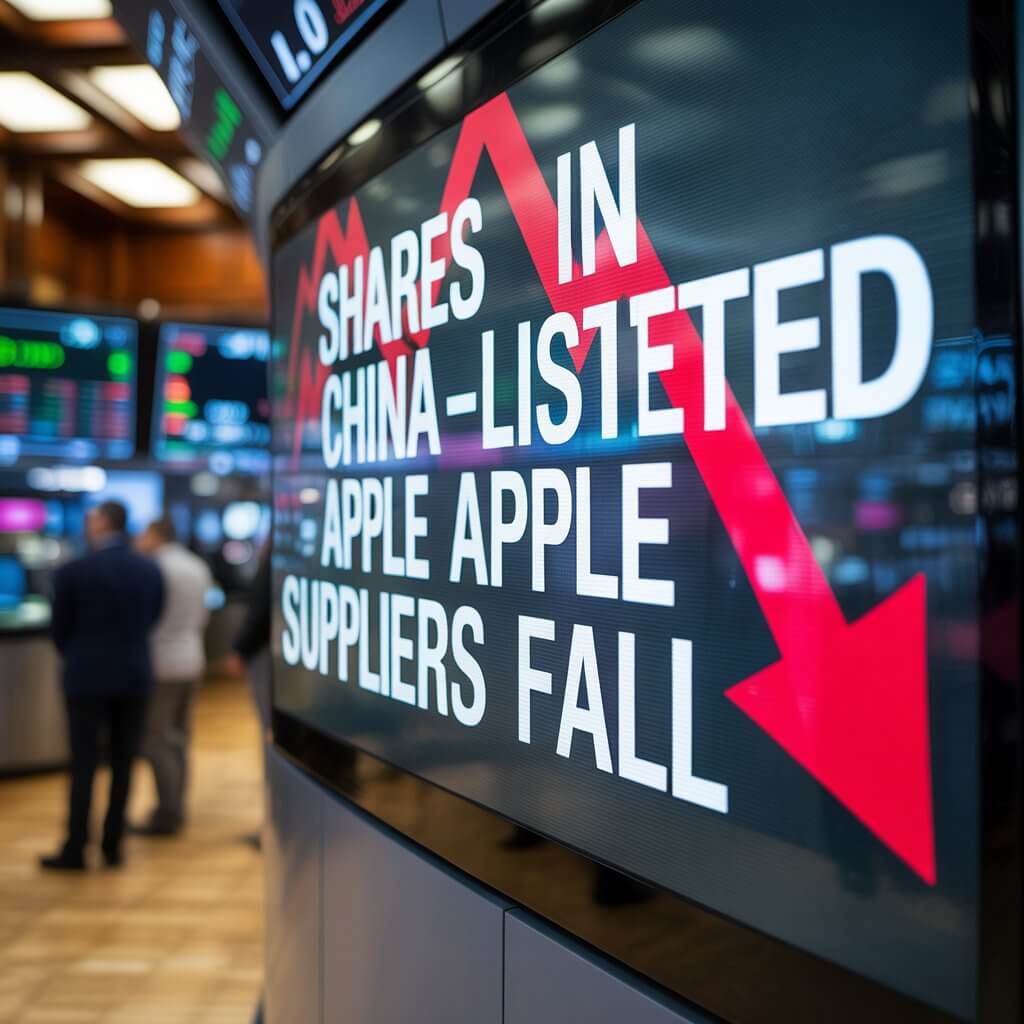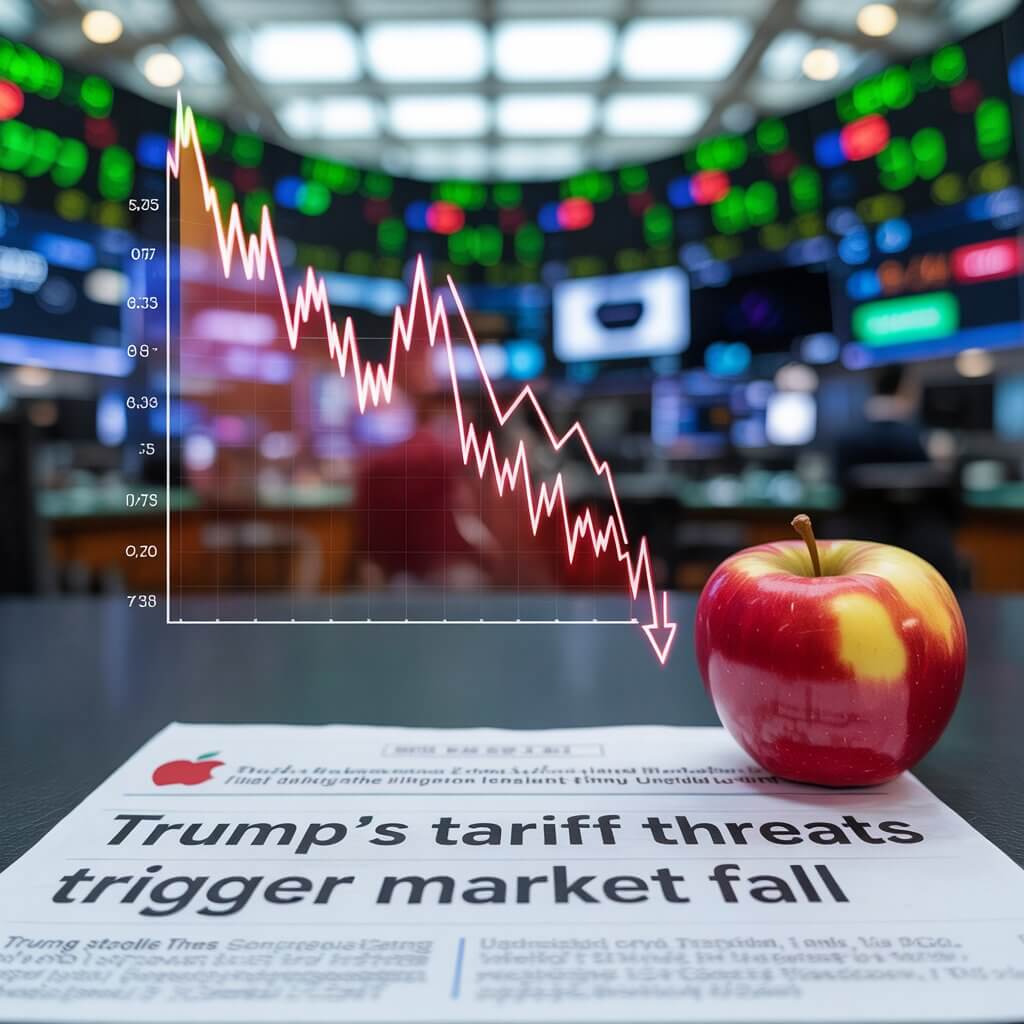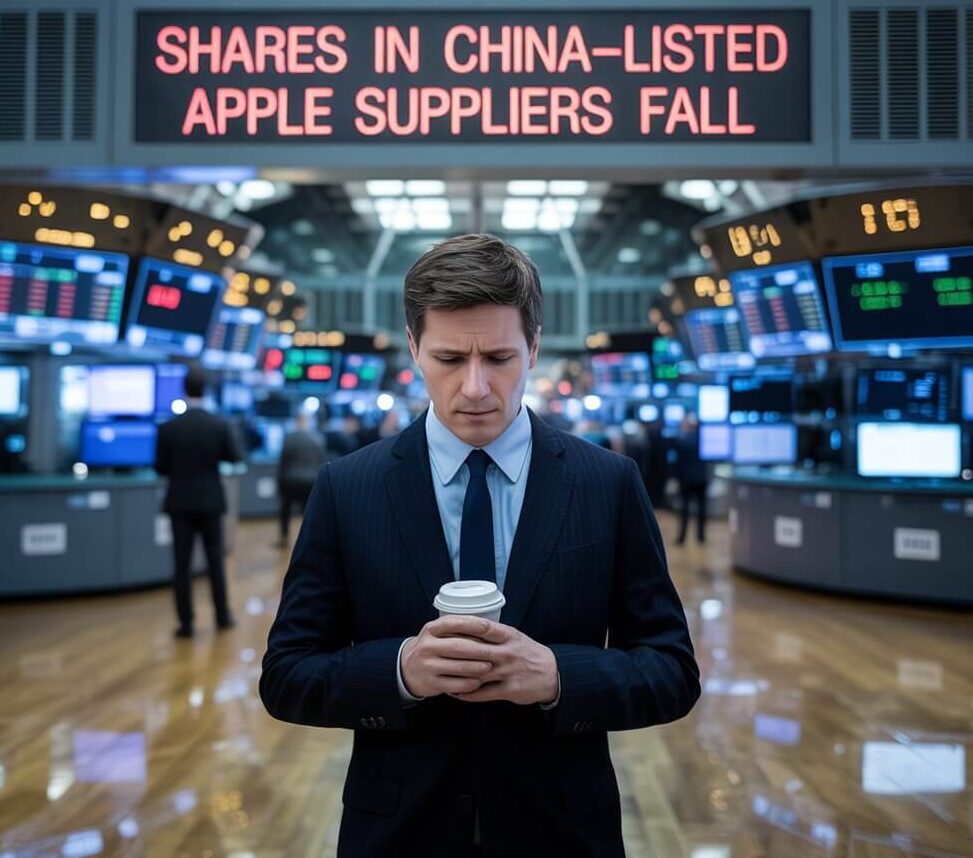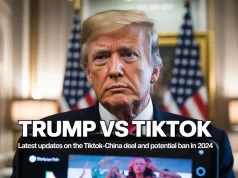Introduction:
Trump’s tariff threats on May 26, 2025, cause Apple suppliers listed in China to lose value which leads to a global market reaction. The news of a potential 25% tariff on imported iPhones by President Trump has sparked new trade issues, mainly for companies such as Luxshare Precision, Goertek and Lens Technology. This article looks at what is driving this market reaction and discusses how it may impact the global tech industry.
📉 Immediate Market Impact
📊 Stock Performance of Key Suppliers
The tariff threats caused the shares of main Apple suppliers in China to fall significantly.
| Company | Stock Code | Price Drop (%) |
| Luxshare Precision | 002475 | -3.2% |
| Goertek Inc. | 002241 | -2.8% |
| Lens Technology | 300433 | -2.5% |
These declines reflect investor concerns over potential disruptions in the Apple supply chain due to increased tariffs.
🏛️ Trump’s Tariff Proposal: A Closer Look
📜 The Tariff Details President Trump is recommending a 25% tariff on imported iPhones that are not made in the U.S.
• A rise to a 50% tariff may occur if companies do not obey by June 1
Investor Sentiment and Market Forecast:
Short-Term vs. Long-Term Effects
Short -Term :Panic selling led to sharp declines
Long-Term:In the long run, businesses might move their factories to places where they won’t face tariffs.
Expert Opinions on the Fallout:
Analysts from Goldman Sachs and Morgan Stanley suggest that if tariffs escalate:
.Apple’s profit margins might drop by 5-10%.
• Vietnamese and Indian companies could take business away from Chinese suppliers.
- Learning How to Read the Market: The Investor’s Dilemma
- The volatility in Chinese-listed Apple suppliers following Trump’s tariff threats makes it hard for investors to decide what to do. It is very important to understand the main feelings present.
Key Factors Influencing Investor Sentiment:
• The main immediate effect of tariffs is on profit margins. Should suppliers have to pay more or give Apple discounts, their earnings will suffer.
• Investors are now considering a “geopolitical premium” or “geopolitical discount” when judging companies heavily affected by the US-China situation. As a result, the political climate can cause investors to undervalue even the best companies.
• Being Supply Chain Prepared: Investors typically see companies that take steps to ensure their supply chains are resilient in a good light.

Table 1: Impact of Tariff Threats on Key China-Listed Apple Suppliers (Illustrative)
| Supplier Name | Primary Product/Service | Initial Stock Reaction to Tariff Threat | Potential Long-Term Impact |
| Luxshare Precision | iPhone Assembly, AirPods | Down 2% | Diversification of orders, increased competition from non-Chinese assemblers |
| Lens Technology | Mobile Screens | Down 1% | Pressure to innovate and potentially establish non-Chinese production bases |
| Goertek | AirPods, Acoustic Parts | Down 11% | Potential reduction in Apple-related revenue, need for new clients |
| Foxconn (Hon Hai) | iPhone Assembly (Taiwanese, but significant China operations) | Minor decline | Accelerating existing diversification efforts to India, Vietnam, etc. |
| AAC Technologies | Acoustic Components | Down 1% | Similar pressures to Goertek, exploring alternative markets |
Actionable Insights for Investors and Industry Professionals :
To succeed in this unpredictable situation, a planned approach is needed. Here are some practical tips:
• Spread Your Money: Investors should avoid investing too much in companies that are mainly exposed to one geopolitical risk.
o Manufacturing in different countries (such as India, Vietnam and Mexico) to reduce risk from one location.
• Examine Long-Term Changes: Besides current tariff worries, review the trend where firms could move their factories to countries that have similar values. It will change the manufacturing landscape around the world in the next decade.
• Leverage New Technology: Companies that can solve their dependency on certain regions or cut costs with technology will be more successful. It covers new technologies for automation and the move to local production. This means: o Forming connections with different suppliers to ensure that you don’t depend on just one for your vital parts.
The Broader Economic Ripple Effect :
Trump’s announcement of tariffs has caused shares in Chinese companies working with Apple to fall and this impact is felt outside the tech industry as well. It creates a worrisome message for all industries that have important links to China.
If companies are unable to manage these costs, they will likely raise prices for their customers.
• Difficulties in Supply Chains: Issues in established supply chains may slow down product development and innovation because of greater complexity and expenses.
• Global Supply Chains: The breaking up of supply chains could make the global economy less smooth and less productive. • Houses could prefer to use local suppliers to avoid any risks linked to distant and unstable partners.

FAQs: Shares in China-Listed Apple Suppliers and Trump’s Tariff Threats
1. Why did Trump’s tariff threats affect Apple suppliers?
As a result, Trump’s proposed tariffs would raise expenses for Chinese exports, directly impacting manufacturers that depend on U.S. demand.
2. Which companies were hit the hardest?
Because they depend heavily on orders from Apple, Luxshare Precision and Goertek experienced the biggest drops.
3. Will Apple move production out of China?
Apple has already begun shifting some production to India and Vietnam, but a full exit from China is unlikely soon.
4. How can investors protect themselves?
Therefore, adding non-Chinese tech providers to your portfolio can help lower your risk.
Or, if you’re connecting it to a previous idea:
As a result of shifting global dynamics, adding non-Chinese tech providers to your portfolio can help lower your risk. In response to these changes, diversifying your tech sources has become a smart and strategic move.
Conclusion: Navigating a New Era of Global Manufacturing
Businesses are now aware of the need to make their supply chains flexible, expand in various parts of the world and keep up with new trade policies.While the short-term effect on share prices is important, the long-term results will likely change the manufacturing industry worldwide. Apple is leading the charge, demonstrating that adapting to geopolitical changes has become an essential aspect of modern business operations. Consequently, we can expect global supply chains to grow more diverse, increasingly regional, and better equipped to handle risks—a result of both economic and ghttps://globalnewspk.com/2025/05/26/apple-suppliers-china/eopolitical forces. As these challenges continue, staying informed and remaining adaptable will be crucial for businesses seeking to navigate the complexities of international trade.














